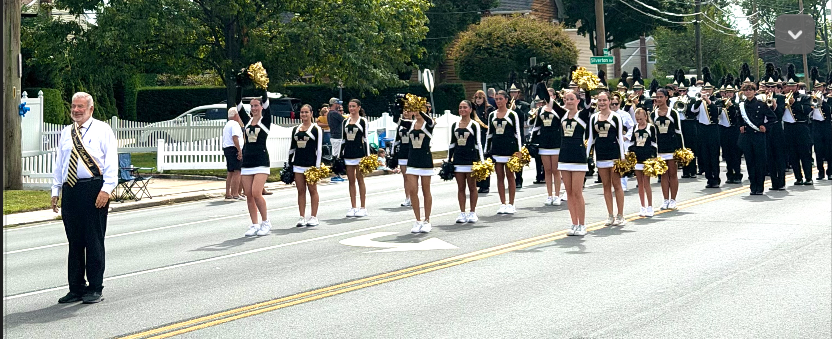Hallmark Channel’s First-Ever “Hanukkah Movies” Are Not the Positive Jewish Representation Jews Wanted
January 7, 2020
When Hallmark announced the two Hanukkah movies it would be making and airing for 2019, Jews across America rejoiced—until they actually saw the movies. These movies would be the first-ever Hanukkah movies to join the channel’s annual tradition of creating wholesome, feel-good Christmas romances each year,
“Double Holiday” and “Holiday Date,” the “Hanukkah” movies put out by Hallmark Channel for 2019, do not feature Hanukkah as their central focus; rather, they are simply poorly-disguised Christmas movies with Jewish characters. The official synopsis of “Double Holiday,” according to Hallmark’s website, is:
Career-minded Rebecca’s plans for Hanukkah don’t go as expected when a promotion opportunity comes up at work. When the company CEO asks Rebecca and her insufferable office mate, Chris – also her main competitor for the promotion – to plan the company’s Christmas party, she realizes they must overcome their opposing styles in order to succeed. Forced to work together on the party, Chris learns more about Rebecca and embraces her family’s Hanukkah traditions, while she also begins to see him in a new light. Although feelings slowly develop between the two, the ongoing competition over the promotion threatens to undermine it all.
According to the Washington Post, the movie features the message that “while the traditions and celebrations are different, the feelings of holiday and celebration and family and togetherness are the same.” However, this seemingly-innocent message, the “opposing styles” of Chris and Rebecca, and the fact that Rebecca “begins to see [Chris] in a new light” hide the fact that in this movie, Hanukkah is treated as a hindrance to Chris being able to celebrate Christmas and Rebecca herself is regarded as a misfit among her Christian co-workers. The film does not treat Hanukkah as its own holiday; rather, it offensively “defines Hanukkah in terms of Christmas” as per the words of Rabbi Hara Person, the chief executive of the Central Conference of American Rabbis
Hallmark’s official website lists the synopsis of “Holiday Date” as:
Brooke is dumped right before Christmas and enlists the help of actor Joel to play
the role of her boyfriend for the holidays. Brooke had described her ex-boyfriend as “Mr. Christmas” to her family and worries about keeping up the ruse when she discovers Joel is Jewish. When her family eventually finds out his background, they happily incorporate his Hanukkah traditions into their plans. Christmas and Hanukkah are celebrated side by side as they all learn more about the other’s holiday. But when their relationship ruse comes to light, the two have some explaining to do as well as figure out if they’re ready to admit their true feelings.
Despite the claim that Brooke and Joel celebrate Christmas and Hanukkah “side-by-side,” a look into the actual content of the film is less innocent than this description makes it seem. Like Rebecca in “Double Holiday,” the character of Joel is treated as “suspicious” and as an outcast, and the fact that he hides being Jewish throughout the majority of the film instead of being proud that he is a Jew, according to Rabbi Hara Person, is based on a stereotype which was immensely popular during the Holocaust era. “The ‘fake’ boyfriend who pretends to be Christian echoes an age-old anti-Semitic stereotype of the duplicitous, deceitful Jew,” as stated in Deseret News.
“These films are for a Christian audience,” said Dianne Ashton in her interview with Deseret News. Ashton is a professor of religious studies at Rowan University. “The majority of what’s going on in these movies is intended to make Christians feel comfortable.” Both films revolve around Christmas and feature similar plots with Jewish characters being forced to celebrate Christmas. Despite Hallmark’s claims that these movies centered around Hanukkah, they are really Christmas films which acknowledge Hanukkah. The Jerusalem Post’s criticism of these films was profound. “These movies are strengthening stereotypes at a time when antisemitic hate crimes are on the rise throughout the US and Europe. Suggesting Jews cannot proudly celebrate their own Hanukkah and instead must join in the Christian spirit and assimilate into the Christian cultural mainstream and hide their Jewish identity is highly problematic.”
Hallmark’s CEO, Bill Abbott, tried to defend the channel’s decisions: “It’s hard if we start to… make movies based off of specific holidays… because we don’t look at Christmas from a religious point of view, it’s more a seasonal celebration.” This brings up another question: why can’t Hanukkah be that same “seasonal celebration” and be the main focus of a movie? Hanukkah has a plethora of non-religious traditions—lighting the menorah, playing dreidel, giving gifts and playing out in the snow just like on Christmas.
Michelle Vicary, Crown Media and the Hallmark Channel’s executive vice president of programming, said in an interview with the New York Post that viewers can expect to see more diversity and inclusivity in Hallmark Channel’s future movies; it is unknown whether or not this will mean they might make an actual Hanukkah movie as opposed to a poorly-disguised Christmas movie in which Hanukkah is involved.














